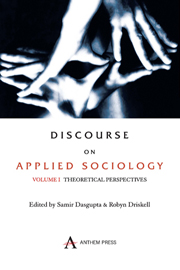Book contents
- Frontmatter
- Contents
- Preface and Acknowledgement
- Contributors to this Volume
- List of Abbreviations
- Introduction
- 1 Re-Orient World History, Social Theory and the Nineteenth Century
- 2 The Unique Complexity of Social Phenomena and the Uses of Social Science Knowledge
- 3 Unlimited Love, Compassion and Forgiveness: Acts of Moral Examplars
- 4 Theoretical Application
- 5 Applied Sociology's Need to Rethink the Tradition: Sociological Theorizing in a Global Framework
- 6 Social Analysis and Social Action
- 7 The Applied Sociologist as Craftsman
- 8 Applied Sociologists: Its Problems and Prospects
- 9 Sociology and its Application in Society: Giving Sociology its ‘Working’ Meaning
- 10 The Evolution of Sociology Back to its Applied Future
- 11 Contemporary Corporate Crime: Theoretical Perspectives, Cases & Consequences
- Index
Introduction
Published online by Cambridge University Press: 05 March 2012
- Frontmatter
- Contents
- Preface and Acknowledgement
- Contributors to this Volume
- List of Abbreviations
- Introduction
- 1 Re-Orient World History, Social Theory and the Nineteenth Century
- 2 The Unique Complexity of Social Phenomena and the Uses of Social Science Knowledge
- 3 Unlimited Love, Compassion and Forgiveness: Acts of Moral Examplars
- 4 Theoretical Application
- 5 Applied Sociology's Need to Rethink the Tradition: Sociological Theorizing in a Global Framework
- 6 Social Analysis and Social Action
- 7 The Applied Sociologist as Craftsman
- 8 Applied Sociologists: Its Problems and Prospects
- 9 Sociology and its Application in Society: Giving Sociology its ‘Working’ Meaning
- 10 The Evolution of Sociology Back to its Applied Future
- 11 Contemporary Corporate Crime: Theoretical Perspectives, Cases & Consequences
- Index
Summary
It is a good sign that the discipline of sociology is held in high esteem, both in its academic and applied form. While some claim sociology as ‘a gauche newcomer’, they also recognize its contribution. The non-sociologists, on the other hand, at times ‘mock at those who pursue it professionally’ (Bruce, 1999). Developmental policies to eradicate social problems mostly depend on sociological insights. Its theory and knowledge are based on the construction of the real society. Bruce (1999) obser ves: ‘Sociology recognizes the socially constructed nature of reality; it identifies the hidden cause of action; it describes the unanticipated consequences of action’. If the sociologists deal with such issues, the attempt would be totally non-professional. The amateur view of sociological explanation is rhetorical and concerned with the world, but professional sociology serves the true purpose of the real world. If it is the discourse of the real world, then it has a humanistic perspective. Peter Berger (1963) says convincingly that sociology as a form of social consciousness includes scepticism about the official claims or common sense interpretation of human behaviour. Some argue that sociology emphasizes in-depth knowledge about society and social life. The wisdom of the ages thus signs the development of sociological theory and thinking. When this theoretical wisdom merges with empiricism the study of sociology undergoes a transformation. The debate of rhetoric vs reality, theory vs application, knowledge-sociology vs practising sociology gradually comes to the fore. Mill's (1961) Sociological Imagination gives a new impetus to the theoreticians and practitioners.
- Type
- Chapter
- Information
- Discourse on Applied SociologyTheoretical Perspectives, pp. 1 - 26Publisher: Anthem PressPrint publication year: 2007



